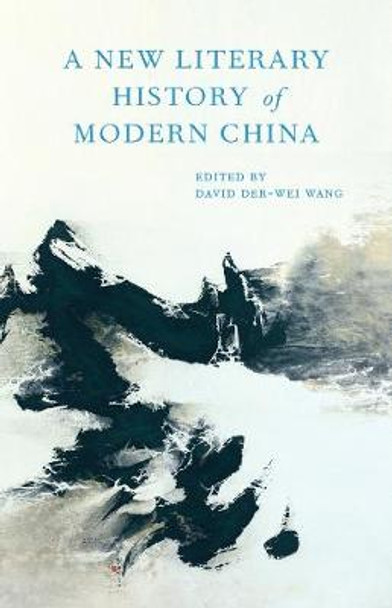Description
Literature, from the Chinese perspective, makes manifest the cosmic patterns that shape and complete the world-a process of "worlding" that is much more than mere representation. In that spirit, A New Literary History of Modern China looks beyond state-sanctioned works and official narratives to reveal China as it has seldom been seen before, through a rich spectrum of writings covering Chinese literature from the late-seventeenth century to the present.
Featuring over 140 Chinese and non-Chinese contributors from throughout the world, this landmark volume explores unconventional forms as well as traditional genres-pop song lyrics and presidential speeches, political treatises and prison-house jottings, to name just a few. Major figures such as Lu Xun, Shen Congwen, Eileen Chang, and Mo Yan appear in a new light, while lesser-known works illuminate turning points in recent history with unexpected clarity and force. Many essays emphasize Chinese authors' influence on foreign writers as well as China's receptivity to outside literary influences. Contemporary works that engage with ethnic minorities and environmental issues take their place in the critical discussion, alongside writers who embraced Chinese traditions and others who resisted. Writers' assessments of the popularity of translated foreign-language classics and avant-garde subjects refute the notion of China as an insular and inward-looking culture.
A vibrant collection of contrasting voices and points of view, A New Literary History of Modern China is essential reading for anyone seeking a deeper understanding of China's literary and cultural legacy.
About the Author
David Der-wei Wang is Edward C. Henderson Professor of Chinese Literature and Comparative Literature, Harvard University, and Director of the CCK Foundation Inter-University Center for Sinological Studies.
Reviews
A New Literary History of Modern China stands far apart from the standard state-of-the-field collection. The publication of this book, with its range and breadth of scholarship, is an event without precedent in the field of modern Chinese literary studies. Some of the essays read like polished vignettes while some are whimsical, others build swiftly to a punchy thesis, and others again offer distilled wisdom on a crucial topic. The brevity of the essays holds the reader's attention at a keen pitch-and more importantly incites more reading. A monumental volume. -- Margaret Hillenbrand, University of Oxford
The next step on the path to literary enlightenment. Editor David Der-wei Wang, a professor of Chinese and comparative literature at Harvard, offers 161 short and often sparkling essays by a multinational array of writers and academics in what seems the most exhaustive introduction to modern Chinese writing possible in a single volume. -- Peter Neville-Hadley * Wall Street Journal *
This monumental anthology on modern Chinese literature is so essential...This book is meant for a broad reading public... It becomes clear reading this book that one can trace the larger history of China itself across the twentieth century by looking at its literature and its writers...A New Literary History offers a potent glimpse into China, as it was and as it is...In this meticulously edited and selected anthology, there really is something for everyone. -- Eleanor Goodman * Los Angeles Review of Books *
Wang's is a daring enterprise...Wang should be applauded for a work compiled to introduce English readers to the habits of Chinese writers and readers...With 161 chapters by more than 140 writers, A New Literary History takes a near-encyclopedic approach to the study of Literary China, one that embraces not only the People's Republic (including Hong Kong) and Taiwan, but also Sinophone and Anglophone writers overseas. -- Geremie Barme * New York Review of Books *
Magisterial...Gargantuan in scope. It covers its subject from the late 18th century to the current millennium...It's a remarkable product, even by Harvard's invariably high standards. -- Bradley Winterton * Taipei Times *
One hundred and forty-three authors contributed 161 short chapters to this monumental survey of modern Chinese literature in all its forms, from the late eighteenth century to the present. Yet the book reads like the work of a single versatile author: vivid, probing, and occasionally playful. It raises to a new level the knowledge available in English about this vast topic, presenting a literary culture more complex, cosmopolitan, and profound than even many specialists might realize. The book presents a wealth of detail about personalities and events throughout the Chinese-speaking world and connects them to cultural forms ranging from poetry, fiction, and opera to pop songs, cartoons, photographs, and film. It challenges much of the received wisdom about how literary history should be written, refutes the cliche that Chinese literature in the modern and contemporary periods has been derivative and mediocre, and opens up inspiring prospects for future scholarship. -- Andrew J. Nathan * Foreign Affairs *
As China continues to grow in economic and political power, its literature is also likely to become more important in the rest of the world. There will be more and more translations of both its classics and its contemporary poetry and fiction. That makes books like this one all the more valuable to readers in the West who want to understand how China's modern literature relates to its recent history. Those who wade into this long and heterogeneous collection will discover that the literature is not just a marker of that history, but a component of it. -- Nicholas Haggerty * Commonweal *
A useful introduction to modern Chinese intellectual history, this collection can be consumed in bite-size pieces. -- Tyler Cowen * Bloomberg View *
Book Information
ISBN 9780674967915
Author David Der-wei Wang
Format Hardback
Page Count 1032
Imprint The Belknap Press
Publisher Harvard University Press




![Writing Taiwan: A New Literary History by David Der-Wei Wang 9780822338512 [USED COPY] Writing Taiwan: A New Literary History by David Der-Wei Wang 9780822338512 [USED COPY]](https://cdn11.bigcommerce.com/s-zkx5lhzlf8/images/stencil/444x444/products/6584376/6661297/9780822338512__41903.1738900779.jpg?c=1)
